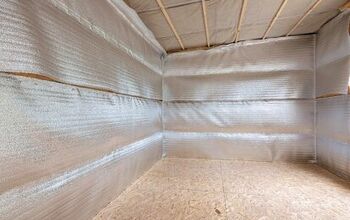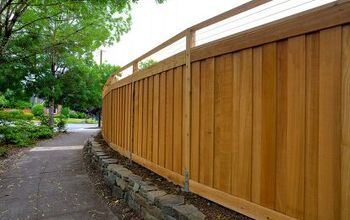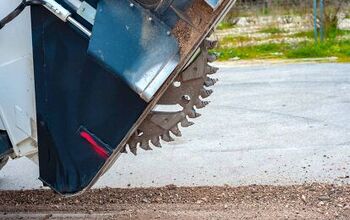I Hear Scratching In My Walls

The sound of animals moving and scratching in your walls is scary. It feels like an invasion of privacy, and it understandably makes people feel unsafe at home. Luckily, there are a few things you can do to quickly fix the problem if you hear scratching in your walls.
Place traps around your house or call a pest control service if you hear scratching in your walls. Pest control professionals can easily find the root of the problem and use appropriate traps. Contact your landlord if you rent and hear animals in your walls as in most cases, it’s their responsibility.
Keep food sources away from your house and close your garbage cans to keep pests away. It’s also important to patch holes and gaps in your walls and roof. Follow along as we explore what to do when you hear scratching in your walls.
How Did An Animal Get In My Wall?
Animals typically get into walls via openings and cracks in your house. Small rodents, like squirrels and mice, can easily slip through holes in your roof and even pipes. Animals can also come inside if you leave windows open and have big gaps under your doors.
They often enter houses to find food, especially if you have pets. For example, some homeowners keep their pets’ food bowls near entry doors. This is a bad idea, as rodents can often smell the food and find a way to enter your house to find it.
Even small gaps in your siding are big enough for rodents to enter. That’s why it’s important to periodically check your roof and siding for gaps to prevent water damage and keep pests away.
What To Do If You Hear Scratching In Your Walls
1. Listen Carefully
It’s important to listen carefully when you hear scratching in your walls. This can help you figure out what type of animal is in the walls and understand their patterns. For example, mice and rats are often the culprits if you hear scurrying, scratching, and chewing at night.
Rats are often slightly louder than mice because they are bigger. However, heavy movement can often indicate that an opossum or raccoon is in your walls or crawlspace. It’s easier to communicate with a pest control service if you already have an idea of what type of animal it is.
Listening carefully can also help you understand how widespread the problem is. For example, you may have an infestation if you hear scratching in several parts of the house simultaneously.
2. Place Traps
Carefully place traps in a few spots throughout your home if you don’t suspect a major infestation. Keep in mind that you shouldn’t attempt to trap large animals, like raccoons, without professional help. Otherwise, you can’t go wrong with a few mousetraps if you hear small scurrying and scratching or find mouse droppings.
Mousetraps cost as little as $10, and they are easy to set up without experience. Simply put a peanut or small piece of cheese in each trap to lure the mice. Granted, you may not be able to access the space behind your walls without professional help. Even still, a few strategically placed mousetraps should significantly help with your mouse problem.
3. Call Pest Control
Not only are animals in the wall inconvenient, but the situation can also become dangerous. Many rodents and other small mammals carry diseases. That’s why pest control services are best equipped to remove harmful animals from your walls, crawlspace, and attic.
Even the droppings that animals leave behind carry harmful bacteria that can threaten your health. Exterminators can easily identify animals based on droppings and in some cases, even from scratch marks. This lets them place the right traps for the situation.
For example, homeowners often assume the problem is mice, so they place mousetraps. However, that won’t help at all if it turns out to be raccoons, rats, or opossums. That’s not a mistake that reputable pest control professionals make, and you can typically trust them.
4. Call Your Landlord
Call your landlord right away if you live in a rental property and hear scratching in your walls. Landlords are responsible for pest control in most cases unless your rental agreement specifies otherwise. However, your landlord may put the responsibility on you if they determine the animal problem is your fault.
For example, they may say it’s your fault if you leave windows open or put food outside for stray animals. Granted, your landlord may not be able to prove it’s your fault, and you can dispute them if they blame you. In that case, it’s a good idea to explain the situation and take pictures to provide evidence if your landlord won’t budge.
Contact a lawyer if all else fails and your landlord refuses to pay for pest control. Regulations vary between states, so it’s important to check local laws before you contact a lawyer. Make sure you have evidence to support your case, or a lawyer may be apprehensive to represent you.
How To Keep Animals Out Of Your House
Remove Food Sources
Food sources, such as bird feeders, attract pests that can eventually wind up in your walls. You can protect bird feeders from pests, but the feeder may still draw animals toward your house. It’s also a good idea to keep your pet food inside, even if your pets spend lots of time outside.
Instead, simply bring your pets inside to feed them throughout the day before you let them back out. Animals are less likely to pay attention to your house if they can’t find any food sources.
Cover Your Garbage
No matter how gross your garbage is, it can still attract animals. Raccoons notoriously snoop through garbage cans. They are more likely to enter your home through weak points to find more food once they get into your trash can. Always cover your trash cans to keep animals and bugs away.
Declutter Your Home
Clutter is the easiest way to attract pests to your home. Whether it be mice, brown recluse spiders, or raccoons, clutter is like a pest magnet. Both indoor and outdoor clutter can attract animals, so it’s time to clean up your house.
Pay attention to rooms you don’t use or clean too often as they are most likely to attract animals. Move piles of clothes and blankets and inspect them for animal droppings. This is a great practice even if you haven’t heard animals scratching in your walls.
Prune Bushes And Trees
Overgrown bushes and trees are just as attractive to animals as clutter. They provide nesting areas that can eventually draw the animals inside. That’s especially true if you have trees and bushes near your house. Not only does pruning help keep pests away, but a well-maintained yard also looks great.
Summing It Up
Call pest control if you hear animals scratching in your walls. Otherwise, you can place traps around your house, but that is risky in some cases. Traps don’t always work for big animals, like raccoons, opossums, and stray cats.
Related Guides:

Nick Durante is a professional writer with a primary focus on home improvement. When he is not writing about home improvement or taking on projects around the house, he likes to read and create art. He is always looking towards the newest trends in home improvement.
More by Nick Durante














![The 10 Best Table Saws - [2022 Reviews & Buyer's Guide]](https://cdn-fastly.upgradedhome.com/media/2023/07/31/9070645/the-10-best-table-saws-2022-reviews-buyer-s-guide.jpg?size=350x220)












